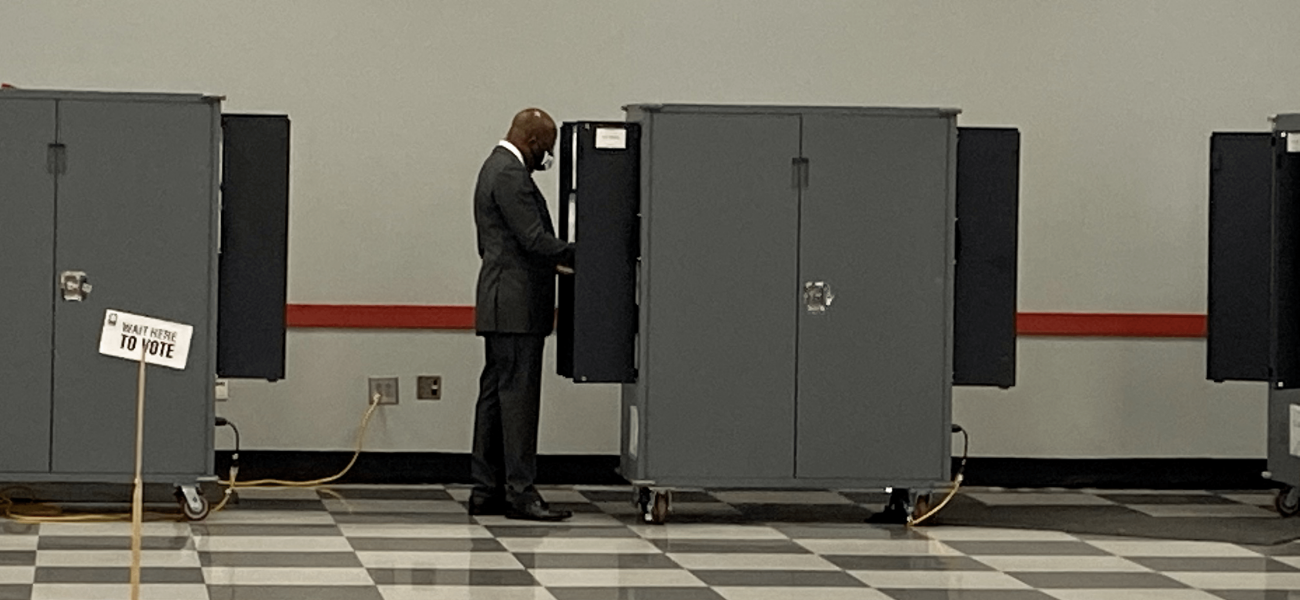Stay ahead of the curve as a political insider with deep policy analysis, daily briefings and policy-shaping tools.
Request a Demo- Georgians will have less time to request and mail in absentee ballots.
- The deadline to cast out-of-precinct ballots has also shrunk.
- There will be more weekends to vote early in most counties.
The Gist
Voting is underway in the 2022 primaries to decide which candidates will compete for governor, secretary of state and other top offices in the November 8 general election.
For most Georgians, this year marks their first encounter with sweeping changes state lawmakers made to election laws last year in response to public concerns over voter integrity in the 2020 presidential contest.
What’s Happening
Passed in March 2021, the controversial Senate Bill 202 (S.B. 202) overhauled how, when and where Georgia voters can cast their ballots, particularly when it comes to voting by mail, voting in the wrong precinct, casting early votes and enjoying refreshments outside polling places.
The Republican-led passage of S.B. 202 sparked outrage from voting-rights advocates who saw the changes as a scheme to depress future turnout among Democratic voters, who flipped the state’s two U.S. Senate seats and won Georgia’s 16 electoral college votes for president for the first time in decades.
“[S.B. 202] will affect all Georgia voters. But consistent with Georgia’s long and ongoing record of discrimination, the burdens will be disproportionately felt by voters of color, especially Black voters,” said a lawsuit that Georgia’s African Methodist Episcopal Church filed last year to block S.B. 202 in federal court. It’s one of eight suits brought against the election bill by groups including the American Civil Liberties Union, the Southern Poverty Law Center and the New Georgia Project.

Georgia Secretary of State Brad Raffensperger faces primary challenges over his refusal to invalidate the election results in Georgia in favor of former President Donald Trump in 2020, with challengers from his own party pushing unfounded claims of widespread voter fraud. (Credit: Brittney Phan for State Affairs)
Backers of the bill called it critical for strengthening confidence in Georgia’s election system amid backlash from many Republican voters who believed former President Donald Trump’s unfounded claims of voter fraud. Republican leaders, including Gov. Brian Kemp, Georgia House Speaker David Ralston (R-Blue Ridge) and Secretary of State Brad Raffensperger have all trumpeted the election bill’s changes.
“While [Democratic gubernatorial candidate Stacey] Abrams and her allies spent the past year claiming S.B. 202 is voter suppression, we are seeing record turnout day after day,” Raffensperger said recently. “Voting in Georgia has [n]ever been easier or more secure.”

Early-voting turnout has been high for Georgia’s 2022 primary elections. Read about what heavy participation in early voting means for this year’s elections by clicking the image above. (Credit: Beau Evans for State Affairs)
Here’s what you need to know about what’s changed before you head to the polls or send a ballot in the mail:
Voting By Mail
Georgia voters looking to cast ballots by mail will have less time to do so. Previously, stay-at-home voters had up to 180 days – roughly 25 weeks – to request an absentee ballot. Now, the request window is 11 weeks.
The deadline to request an absentee ballot has also been moved to two Fridays before an election, which is a week earlier than before. The last day to request a mail-in ballot is 11 days before an election, instead of 4 days.

Georgia’s primary elections for statewide offices will be held on May 24, 2022. (Credit: Brittney Phan for State Affairs)
There will also be fewer drop boxes for absentee ballots in highly populated counties. Lawmakers last year limited drop boxes to one per 100,000 voters. That shrunk Fulton County’s drop boxes from a total of 38 boxes in the 2020 election to just eight.
Additionally, absentee voters now need to give their driver’s license number or other official ID number to receive a ballot. Previously, voters only had to provide their signature on absentee ballots and request forms to verify their identity.
You can request an absentee ballot on the secretary of state’s website here.
Out-of-Precinct Ballots
Typically, so-called “provisional ballots” are used when voters show up at a different precinct than where they’re registered. It’s essentially a method for poll workers to double-check an out-of-precinct ballot’s validity before adding it to the official vote count or rejecting it.
Nearly 22,000 provisional ballots were cast in the 2018 general election, according to the U.S. Election Assistance Commission. Many election experts predict an increase this year since thousands of voters were shifted to new, different polling places due to redistricting.

Voters line up outside an Atlanta polling place during early voting for the U.S. Senate runoffs in December of 2020. (Credit: Beau Evans for State Affairs)
Meanwhile, S.B. 202 dramatically shrank the window for polling places to accept provisional ballots. Previously, voters could cast a provisional ballot at any time on election day. Now, provisional ballots will only be accepted after 5 p.m.
“That’s why it’s more important than ever for voters to check their correct precinct before going to the polls on Election Day,” said the Fulton County Elections Board on its website.
Find your polling place location on the secretary of state’s “My Voter Page.”
More Early Voting
While rules on absentee voting and provisional ballots have tightened, state lawmakers last year expanded early-voting days and hours in many Georgia counties.
S.B. 202 required counties to include one mandatory Saturday of early voting as part of the three-week period before primaries, general elections and runoffs. Counties also now have the option to add a Sunday of early voting. Many have chosen to do so.

State lawmakers pass the election bill S.B. 202 in the Georgia Senate during the 2021 legislative session at the State Capitol in Atlanta. (Credit: Beau Evans for State Affairs)
Early voting is already playing a huge role in the 2022 primaries currently underway. More than 416,000 early ballots have been cast since May 2, roughly triple the amount cast at the same point in the 2018 primaries, according to the secretary of state’s office.
The primary election will be held on May 24. Any runoffs for the primaries are scheduled for June 21. The general election to decide Georgia’s governor, statewide offices and a U.S. Senate seat is set for November 8.
Find whether your county’s polling places are open for early voting on Saturdays and Sunday at the secretary of state’s website here.
BYOB
Going to vote on election day? In Georgia, you might need to bring a lawn chair. And a bottle of water.
In the 2020 primaries, many voters in Atlanta and other heavily populated parts of the state waited several hours in line to cast ballots. The long waits prompted state officials to investigate Fulton County’s election management.
S.B. 202 banned anyone except poll workers from handing out food and water within 150 people of a polling place or within 25 feet from voters waiting in line. Poll workers can still set up “self-serve water from an unattended receptacle,” the bill says.
Critics called the ban cruel and likely to most affect minority communities where lines have stretched the longest. Supporters say the rule helps prevent party activists from influencing election day votes.
Join the Conversation
What else do you want to know about Georgia’s elections? Share your thoughts/tips by emailing [email protected].
Newly minted Senate Minority Leader Harold Jones II: ‘I’m not the typical back-slapping politician’
Nearly 10 years into legislative life, Sen. Harold Jones II wouldn’t change anything about the experience. “I love every minute of it. Even when I hate it, I love it,” the 55-year-old Augusta Democrat told State Affairs. Come January, Jones will add another role to his legislative duties: Senate minority leader, a job held for …
Gov. Kemp calls on state agencies to be fiscally restrained amid record $16.5B surplus
The Gist Gov. Brian Kemp asked the state’s 51 government agencies for continued fiscal restraint when drafting their amended fiscal year 2025 and 2026 budgets. Most agencies adhered to his request even as the state’s general fund surplus hit a record $16.5 billion last month. Forty-five agencies, excluding state courts, followed the governor’s instructions to …
Georgia defies bomb threats as election chief declares a “free, fair and fast” vote amid record turnout
ATLANTA – Despite dealing with over 60 bomb threats, Georgia’s election chief said Tuesday the state’s general election went smoothly. Georgia had a record turnout with nearly 5.3 million people voting, Secretary of State Brad Raffensperger told reporters. Election officials in the state’s 159 counties have until 5 p.m. to certify votes. “We had a …
In the (state)house: Meet the newest members of the Georgia legislature
When lawmakers reconvene at the state Capitol on Jan. 13, there’ll be a cadre of new faces in the 236-member Georgia General Assembly, one of the nation’s largest state legislatures. All 236 statehouse seats were up for election this year. Most candidates ran unopposed. Incumbents in contested races easily kept their seats, with the exception …





